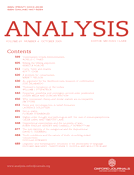-
Views
-
Cite
Cite
Rebecca Roache, Bilking the bilking argument, Analysis, Volume 69, Issue 4, October 2009, Pages 605–611, https://doi.org/10.1093/analys/anp099
Close - Share Icon Share
Extract
Is it conceptually possible for an event, L, to be the cause of an earlier event, E? Some writers have employed the so-called bilking argument to attempt to show that the idea of such backwards causation is incoherent (Flew 1956, 1957, 1964, Black 1956). According to this argument, if we are presented with what someone claims to be a case of backwards causation, it would be possible in principle to wait for E to occur, and then intervene to prevent the occurrence of L, thus demonstrating that E could not have been caused by L after all. Moreover, if our attempts to bilk L-type events (for short, L-events) having observed E-type events (E-events) always fail, we have grounds to argue that any causal relationship between the two is not one of backwards causation, but of ordinary, forwards, earlier-to-later causation.
Does the bilking argument succeed in showing backwards causation to be incoherent? Before answering this question, let us deal with a far simpler reason for deeming backwards causation incoherent, whose elucidation now will be useful later. To those attracted to the view that temporal order is determined by causal order,1 backwards causation may seem incoherent because on this view a cause is by definition earlier than its effect. I do not take issue with this view, and wish my conception of backwards causation to be compatible with it.2 By ‘backwards causation’, I mean causation that runs in the opposite direction to some other causal processes, such that the temporal order entailed by such backwards causation is the reverse of that entailed by those other causal processes. In most philosophical discussions of backwards causation, we are at least implicitly given reasons to believe that these other causal processes dictate the dominant temporal order in that world, with respect to which causation in the opposite direction occurs backwards. This is either because these other causal processes make up the vast majority of causal processes in that world, or because they include the mental causal processes of subjects with whom we are invited to identify, such that backwards causation runs backwards with respect to the temporal order we experience. On the other hand, in worlds where roughly as many causal processes – including mental causal processes – run in one direction as in the other, it would be arbitrary to take either group of processes to determine the dominant temporal order. Since the group of worlds in which backwards causation is possible should include the latter sort of worlds, it is perhaps preferable to dispense with talk of backwards causation in favour of talk of bi-directional causation. But, since so many writers use the term ‘backwards causation’, I will follow suit.




